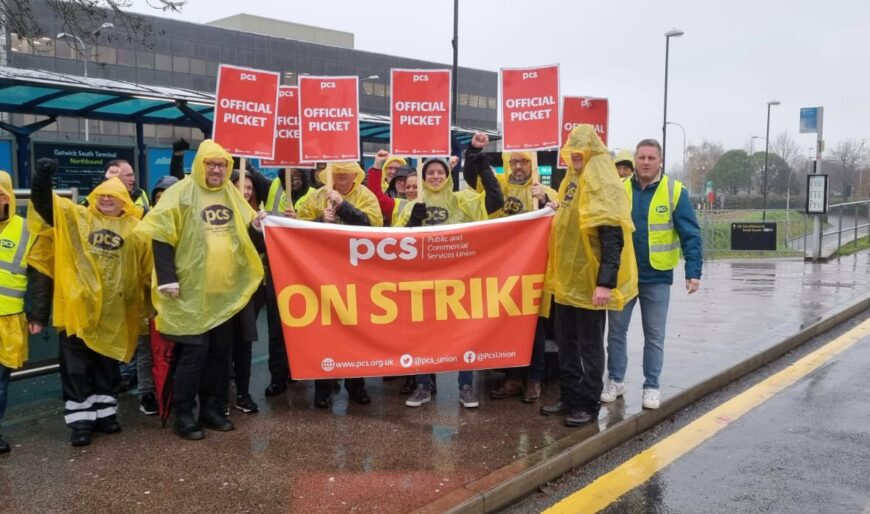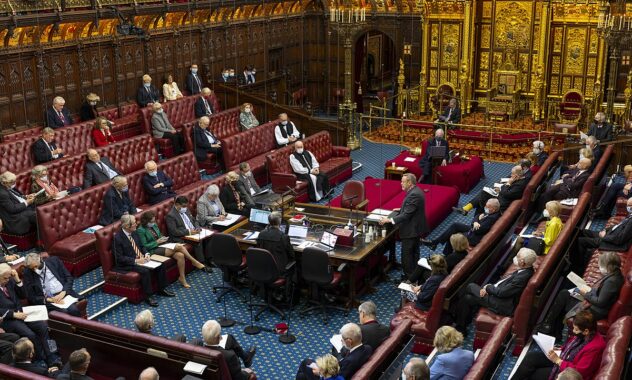Minimum service level legislation extended to ambulance, rail and border workers
MSL provisions to be laid in Parliament today (Tuesday)

Controversial Government legislation designed to provide minimum levels of service during strikes have been extended to ambulance staff, rail workers and Border Force employees. Ministers had launched a consultation on minimum service levels for ambulance staff and passenger rail workers after the Strikes (Minimum Service Levels) Act became law.
That legislation, which was passed in Parliament earlier this year, faced robust criticism from trade unions at the time, describing it as unworkable and in breach of international standards on the right to strike.
Prime Minister Rishi Sunak said:
“We are doing everything in our power to stop unions derailing Christmas for millions of people. This legislation will ensure more people will be able to travel to see their friends and family and get the emergency care they need.
We cannot go on relying on short-term fixes – including calling on our armed forces or civil servants – to mitigate the disruption caused by strike action.
That’s why we’re taking the right long-term decision to bring in minimum service levels, in line with other countries, to keep people safe and continue delivering the vital public services that hard-working people rely on.”
The regulations will apply to employees of Border Force and some Passport Office staff in England, Wales and Scotland. Border Force services will have to be provided “at a level that means that they are no less effective than if a strike were not taking place” and selected Passport Office staff needed for the purpose of national security will be required to work during industrial action.
Home Secretary Suella Braverman said:
“We must never allow strike action to compromise our border security or cause significant disruption to passengers and goods at our borders.
The Armed Forces have commendably stepped up to fill vital roles during recent industrial action, but it would be irresponsible to rely on such short-term solutions to protect our national security.
The minimum service levels announced today will ensure a fair balance between delivering the best possible service to the travelling public, maintaining a secure border and the ability of workers to strike.”
Under the rules for train operators, the Government said regulations will mean the equivalent of 40% of normal timetables operating as normal.
Minimum service levels for ambulance workers will apply in England only. The Government have said that the legislation has been designed to ensure that emergency services “will continue throughout any strike action”.
The Strikes (Minimum Service Levels) Act gained Royal Assent in July, despite significant opposition from trade unions.
Employers will be able to issue work notices to trade unions and employees to identify people who are required to work during industrial action. If the union fails to ensure their members comply with the work notice, they will lose their legal protection from damages claims, the maximum award for which rose from £250,000 to £1 million last year.
The Department of Health and Social Care is currently seeking evidence on expanding the scope of minimum service levels to cover other urgent and emergency hospital-based services which could include nurses and doctors. The consultation closes on 14 November.
Education Secretary Gillian Keegan has committed to introducing minimum service levels in schools on a voluntary basis, if an agreement can be reached with unions. The department also plans to consult on introducing minimum service levels in universities.
The government said it would also consult on plans to remove regulations that prevent employers from supplying agency workers to cover the duties normally performed by striking workers. This is despite this year’s High Court ruling that repealing agency worker strike laws was unlawful.
Unions across the sectors affected met the Government’s announcement with a furious response. Mick Lynch, general secretary of the RMT union, said:
“We believe employers have the discretion not to issue minimum service work notices and, as such, we are calling on them not to issue them. Any employer that seeks to issue a work notice will find themselves in a further dispute with my union.”
TUC general secretary Paul Nowak said:
“These anti-strike laws won’t work. The crisis in our public services is of the Government’s own making. Rather than engaging constructively with unions, they are attacking the right to strike, and they are punishing paramedics and rail staff for daring to stand up for decent pay and better services. These new laws are unworkable, undemocratic and almost certainly in breach of international law.
The UK already has some of the most restrictive trade union laws in Europe. It is already harder for working people here to take strike action than in any other western European country. Now the Tories want to make it even harder for people to win fair pay and conditions. Unions will keep fighting this spiteful legislation. We won’t stop until it is repealed.”
GMB national secretary Rachel Harrison said:
“This is yet another blatant attempt from this Government to distract from the mess they have made of public services. Official figures show patient safety improved during national ambulance strike days. Thanks to the planning of unions themselves, time spent waiting for an ambulance went down during strikes, not up.
The stark truth is that public services are not able to deliver safe staffing levels on any day, not because of strikes but because of years of underfunding. While the Government continues to scapegoat staff, it is patients and staff who will continue to pay the price for their neglect.”
PCS general secretary Mark Serwotka said:
“Given the important nature of the work that our members in the Border Force and Passport Office carry out, this legislation, which is at odds with international law, is dangerous and reckless.
That is why we will have no choice but to resist this vindictive attack on our members and workers across the movement by building mass opposition, which may include a strategy of non-compliance and non-cooperation to make this legislation unworkable.”







